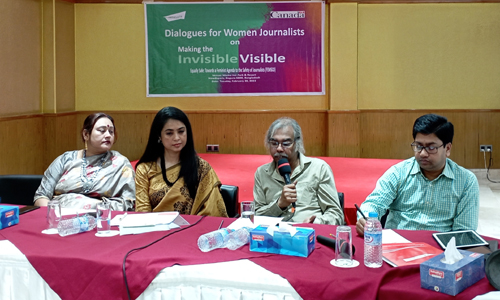
The women journalists are often victimized by sexual harassment, threats, discrimination at workplace as well as outside of workplace in Bangladesh. The number of violence has an upward trend that causes a clear rise in self-censorship, violence, job loss or quit the profession.
Bangladesh government needs to develop a National Action Plan to ensure safety and well-being of women journalists as per the United Nations resolution on Women, Peace and Security (UNSCR 1325). The speakers came up with their opinions in a sub-national dialogue for women journalists titled “Making the Invisible Visible” held in Momo Inn Park & Resort, Bogura on Tuesday, February 28, 2023.
The dialogue was organised by ARTICLE 19 South Asia, an international human rights organisation working on freedom of expression and right to information, under a Global Project ‘Equally Safe: Towards a feminist agenda to the safety of journalists (FEMSOJ)’ with the funding of Global Affairs Canada (GAC) in six countries in South America and South Asia.
25 journalists from print, electronic and online media along with editors, and media owners participated at the dialogue session. Discussants included Sumona Roy, Publisher and Editor, Daily Chandni Bazar, Bogura and Dr. Md. Matiur Rahman, Deputy Executive Director, TMSS. Faruq Faisel, Regional Director for ARTICLE 19 South Asia moderated the dialogue session.
Rumky Farhana, Senior Program Officer of ARTICLE 19 presented the keynote paper pointing out the objectives and scope of the training as well as highlighted the organisation’s activities to protect and promote the safety of journalists with feminist approach. She spoke about safety of journalists with feminist approach, intersectional gender approach, the legal framework for protecting journalists, and silence and paranoia within and outside workplace in Bangladesh’.
Sumona Roy, Publisher and Editor, Daily Chandni Bazar, Bogura said, “Ensuring a women-friendly work environment, removing social and religious prejudices, family barriers and ensuring security will encourage women to enter the journalism profession.”
Dr. Md. Matiur Rahman, Deputy Executive Director, TMSS said, “Media is the mirror of the society. Understanding the different types of threats women journalists face, and how certain threats may be experienced differently by women journalists compared to their male counterparts is essential to ensure more women in journalism profession.”
Journalist Nasima Akter Chutu of Daily Karatoa said, “ Financial security needs to be ensured to make women journalists sustainable in the journalism profession.”
Journalist Milon Rahman of Daily Ittefaq said, “There will be no women journalists at the district level if the attitude of people is not changed.”
Faruq Faisel, Regional Director, ARTICLE 19 South Asia said, “In Bangladesh, the safety of journalists is under threat with multiple accounts of violence including assassinations, enforced disappearances, and legal harassments. Journalists become more vulnerable in the time of elections and pandemic like COVID 19.
In every situation, women journalists are more vulnerable at the workplaces and outside of work places than their men counterpart as violations automatically impact the less empowered segments more severely.”